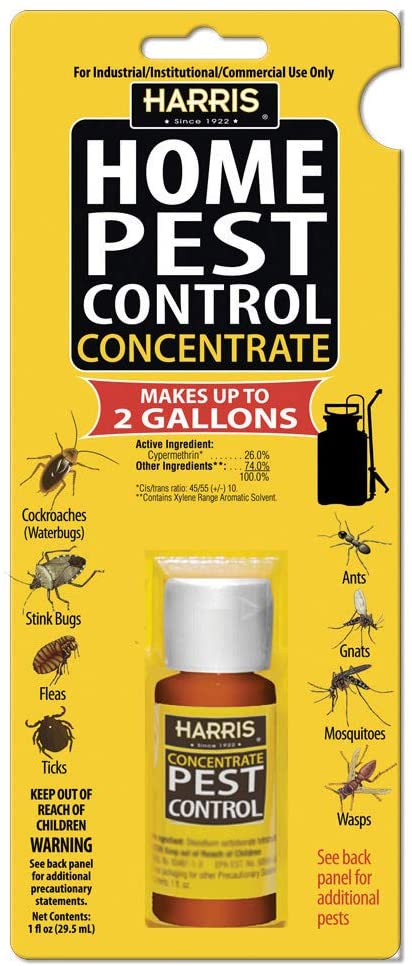A1 Residential Pest Control Portland OR Bed Bugs - Secure Your Home
A1 Residential Pest Control Portland OR Bed Bugs - Secure Your Home
Blog Article
Reliable Pest Control Providers: An Extensive Consider Elimination Techniques and Avoidance Actions
In the realm of insect control solutions, the successful monitoring of infestations calls for a precise strategy that integrates numerous techniques and measures for both elimination and avoidance. From Integrated Insect Management (IPM) strategies that focus on sustainable options to chemical extermination techniques created for targeted removal, the collection versus insects is diverse and substantial.

Integrated Insect Monitoring (IPM) Methods
Integrated Parasite Management (IPM) Approaches incorporate a comprehensive technique to pest control that concentrates on surveillance, avoidance, and control approaches to properly take care of pest populaces. By integrating different strategies, IPM intends to minimize the effect of parasites while also lowering the dependence on chemical pesticides. Prevention lies at the core of IPM, stressing practices like correct hygiene, maintenance of health, and securing entry factors to discourage insects from infesting structures. Monitoring plays a vital function in IPM by regularly identifying and evaluating insect levels to figure out the suitable intervention limits. Control approaches in IPM prioritize making use of physical, biological, and social approaches prior to turning to chemical therapies as a last resource. These techniques include presenting all-natural killers, habitat adjustment, and employing capturing tools to maintain parasite populations in check. In general, IPM cultivates a sustainable and environmentally conscious method to pest administration, promoting long-lasting remedies that secure both human health and wellness and the environment.
Chemical Elimination Methods
Chemical elimination strategies are frequently utilized in parasite control services to successfully get rid of insect populaces that position a danger to human wellness and property. These techniques include using various chemical substances specifically made to target and get rid of insects such as pests, rats, and various other unwanted animals. The application of chemicals, pesticides, rodenticides, and other chemical agents is thoroughly controlled to make certain optimum performance while minimizing dangers to people, family pets, and the setting.
One of the crucial benefits of chemical elimination methods is their ability to provide fast and targeted results, making them particularly beneficial in situations of severe invasions or immediate insect control needs - a1 bed bugs exterminator portland. Nonetheless, it is necessary to highlight the value of correct handling, application, and disposal of these chemical products to prevent unplanned damage
Moreover, integrated insect management (IPM) methods usually combine chemical extermination methods with various other approaches such as hygiene, environment alteration, and organic controls to develop a detailed and sustainable insect control method. By integrating chemical extermination techniques carefully within an IPM framework, insect control services can properly handle pest populaces while minimizing potential dangers to human wellness and the atmosphere.
Biological Pest Control Approaches
Using natural predators and bloodsuckers to take care of bug populations straight from the source is a lasting technique understood as organic bug control. This method utilizes the natural devices of the ecological community to manage insect populaces without relying upon synthetic chemicals. One common biological control technique involves presenting all-natural opponents of the target bug species, such as ladybugs for aphid control or nematodes for termite invasions. These all-natural killers eat the bugs, assisting to keep their populaces in check.
Another reliable biological control approach is using microbial pesticides. These are naturally occurring microbes, such as fungis, germs, and viruses, that specifically target and infect particular bug species. By using these microbial agents, parasite populaces can be successfully lowered without triggering or harming beneficial microorganisms damage to the setting.
Physical Insect Prevention Actions
Executing physical pest avoidance procedures involves using barriers and structural modifications to deter parasites from infesting a residential property or entering. Installing door moves, displays on windows, and securing fractures in the structure can help protect against pests like pests and rodents from getting accessibility inside.
An additional physical prevention measure is using obstacles like secure fencing to maintain larger bugs such as raccoons or deer far from the residential or commercial property. Setting up mesh or cable displays around yards can safeguard plants from being damaged by pests. Appropriate why not check here waste management, including securing wastebasket with tight-fitting lids, is vital in deterring parasites like rodents, pests, and raccoons. By executing these physical bug prevention steps, homeowner can significantly lower the risk of parasite problems and the damages they can create.
Professional Parasite Inspection Procedures
Performing methodical and extensive parasite inspections is a fundamental aspect of expert parasite administration protocols. Expert insect examiners are educated to diligently take a look at residential or commercial properties for indicators of problems, determining pest species, access factors, and favorable problems.

Final Thought
In verdict, efficient insect control services use a selection of methods, consisting of Integrated Insect Management strategies, chemical elimination methods, organic controls, and physical prevention measures. Professional bug assessment treatments play an important function in determining and dealing with pest concerns in a timely manner. By executing a combination of these approaches, residential property proprietors can efficiently prevent and take care of insect infestations.
From Integrated Pest Management (IPM) strategies that prioritize lasting services to chemical extermination techniques designed for targeted elimination, the collection against pests is complex and huge.Integrated Insect Monitoring (IPM) Approaches include a detailed pop over to this web-site strategy to pest control that focuses on control, monitoring, and avoidance techniques to effectively handle parasite populaces.Chemical extermination methods are commonly used in parasite control services to efficiently eradicate pest populations that position a risk to human health and property.Using natural killers and bloodsuckers to take care of insect populaces is a sustainable approach recognized as biological pest control.In final thought, effective bug control services employ a variety of techniques, consisting of Integrated Bug Administration methods, chemical elimination approaches, biological controls, and physical prevention actions.
Report this page